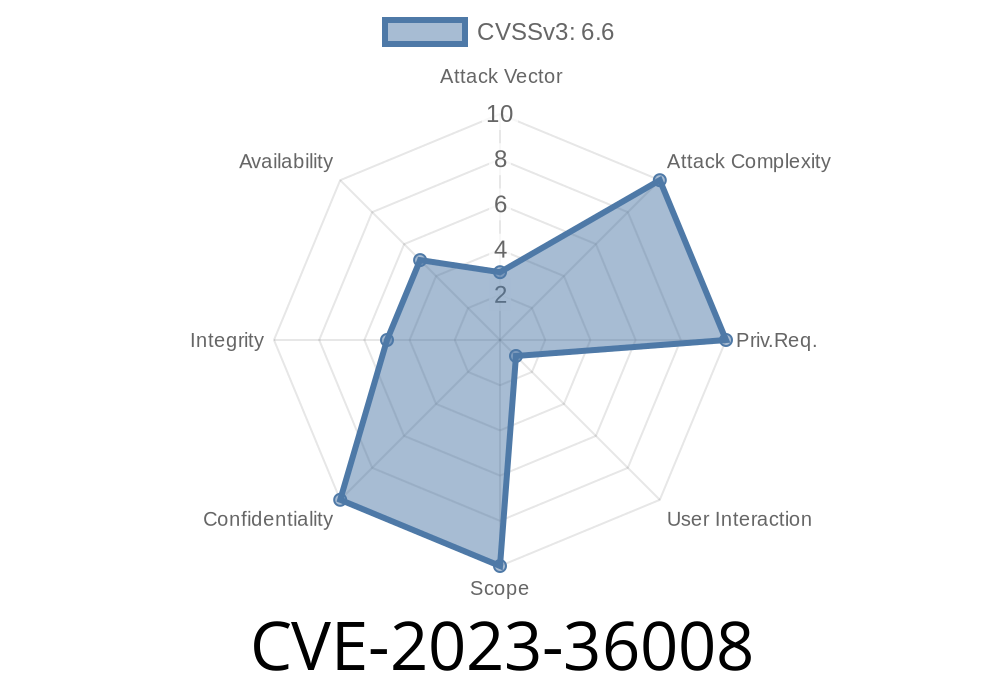In late 2023, security researchers and Microsoft revealed a critical remote code execution (RCE) vulnerability in Microsoft Edge, tracked as CVE-2023-36008. This issue directly affects the Chromium-based versions of the browser—which means Chrome and other Chromium derivatives could be impacted if they inherited similar code. In this long read, we’ll break down how this vulnerability works, give you an easy-to-understand explanation, review exploit details, and provide reference links. Finally, we’ll include code snippets representing the vulnerability and the exploit, simplified for educational purposes.
TL;DR: Why Is CVE-2023-36008 So Critical?
A remote attacker could trick Edge into running code on your computer, just by making you visit a malicious website. This means malware, data theft, spyware—whatever the attacker wants—could happen without you even noticing. The vulnerability was rated critical by Microsoft.
1. A Brief Look: What’s Behind CVE-2023-36008?
Microsoft Edge runs on Chromium, which is an open-source browser engine maintained by Google. Microsoft adds its own integrations for Windows, Office, and sometimes for enterprise use. This vulnerability comes from the way Edge processes untrusted web content—in this case, a flaw in how scripting or rendering is handled.
The vulnerability could be triggered by specially crafted web pages. If exploited, it could grant attackers the same permissions as the user running Edge. If you’re an admin, that’s game over.
According to Microsoft’s security bulletin:
> "An attacker who successfully exploited this vulnerability could execute arbitrary code in the context of the current user. The attacker could then install programs; view, change, or delete data; or create new accounts with full user rights."
2. How Could Attackers Exploit It?
The flaw was an issue in how Edge handled certain JavaScript objects, causing memory corruption. Attackers could use something called "heap spraying" or a "use-after-free" bug to take control of the browser process.
Malware payload is dropped onto the victim’s computer.
Note: In real life, attackers may chain this with other vulnerabilities to escape browser sandboxes.
3. Patch Status & Who’s At Risk?
Microsoft patched the issue in an emergency Edge update in November 2023. However, users and organizations who delay updates remain exposed. According to Google’s Chromium security tracker and Microsoft’s Edge release notes, similar issues have affected Chrome in the past.
Edge Version Affected: v117..2045.60 and earlier
Patched In: v117..2045.67 and above
a) Vulnerable JavaScript Pattern
Here’s a conceptual code snippet, inspired by public discussions and bug reports (not real exploit code):
// Simulate a use-after-free bug
let victim = new Array(10);
function trigger() {
for (let i = ; i < 10000; i++) {
let arr = new Array(100);
}
victim.someProperty = 1234; // Unexpected object state
}
// Potential exploit: attacker sprays memory, then triggers bug.
for (let i = ; i < 100; i++) {
trigger();
}
// Edge's memory could now be corrupted, enabling code execution
*NOTE*: The real CVE-2023-36008 exploit is much more complex and tailored for the browser’s internals.
Here's a simplified pseudo-exploit payload delivery
// Pseudo-payload delivery
if (window.navigator.userAgent.includes('Edg')) {
let buffer = new ArrayBuffer(1024);
let view = new DataView(buffer);
// Write shellcode or malicious instructions
view.setUint32(, x90909090); // NOP sled, for demonstration
// More steps to trigger the RCE via the memory bug
}
Official resources
- Microsoft Security Response Center: CVE-2023-36008
- Microsoft Edge Release Notes
- Chromium Security Advisories
6. Final Thoughts
CVE-2023-36008 reminds us how dangerous browser vulnerabilities can be—especially in browsers tied closely to the operating system, like Microsoft Edge on Windows. A single click could have let an attacker drop ransomware, steal files, or take over your account.
If you’re an enterprise admin, push security updates fast. Don’t let critical vulnerabilities linger—because attackers are quicker than you think.
Stay informed, stay updated, and stay safe online!
*If you found this write-up useful, share it to spread awareness—one patch can save you from disaster.*
Timeline
Published on: 11/16/2023 20:15:28 UTC
Last modified on: 11/24/2023 17:48:44 UTC
